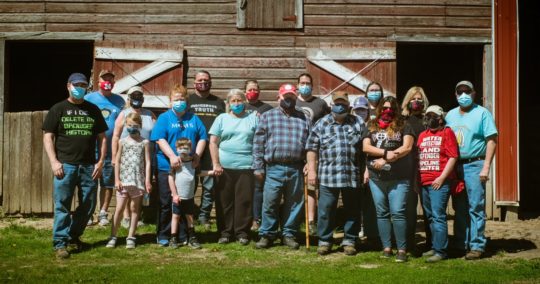One of the largest oil spills in Alberta, Canada occurred this week, reinforcing Nebraskans’ concerns that our state is not prepared for the massive tarsands oil pipeline planned by TransCanada. The full amount of the Alberta spill is not yet confirmed, but early estimates have the spill at 1,176,000 gallons of oil. Nebraska groups working on the pipeline issue are calling on Secretary Clinton to deny the permit to TransCanada, and for Governor Heineman and the Unicameral to pass state-based regulations.
Action:
On May 12th, we will hold a “Citizen Hearing” in Lincoln to gather comments to submit to Sec. Clinton but to also urge the Unicameral and Heineman to pass state-based regulations. Sign this petition so we have your email. We will send you more info in the next few days on the Citizen Hearing!
Background:
The massive oil spill is causing illness among families who live in the area and widespread environmental and wildlife impact. Residents are reporting headaches and dizziness from the fumes.
The early reports of the spill indicate the leak started with an undetected pinhole leak.
- To put this spill into perspective, the pipe in Canada was pumping 187,000 barrels of oil per day and had a spill of 1,176,000 gallons because of a pinhole leak that went undetected.
- The Keystone XL will pump almost 1 million barrels per day, which is five times the amount of the Canadian pipe that leaked. Therefore, if the proposed Keystone XL had a similar leak, we could see almost six million gallons of oil spilled in Nebraska.
According to Globe and Mail, a Canadian paper, the spill was caused by three factors that group leaders and experts in Nebraska raised as concerns for the TransCanada Keystone XL project:
- The pipeline company could have been running it with too much pressure.
- There may have been a problem with the protective coating in the pipe that led to corrosion.
- The land might have shifted.
Nebraska groups’ concerns of financial liability in the event of an oil spill and cleanup responsibility were reinforced by the spill in Michigan last summer and again by this most recent spill in Canada. As oil companies scramble to deal with the public relations fall-out of the spills, landowners and citizens are left cleaning up their land and rivers, figuring out the next steps for their communities and wondering who will pay for the short and long-term impacts.
Quotes from Nebraska Groups:
“This proves, yet again, that oil pipelines leak. By not taking steps to protect our precious groundwater, Sandhills, and landowners, we are jeopardizing the good life for ourselves and future Nebraska citizens. They, and we, deserve better.” -Marian Langan, Executive Director of Audubon Nebraska
“These two massive oil pipeline failures are a wakeup call for all Nebraskans, including our Legislature, because it shows that oil pipelines do fail, and appropriate state guidance on these issues needs to be in place. Why the Nebraska Legislature fails to protect the interests of Nebraska landowners, citizens, and our natural resources continues to be an ongoing unsolved mystery. It seems a Canadian oil pipeline company has more influence in our Legislature than Nebraska citizens and landowners do. The three Bills before the Nebraska Legislature all deserve to be discussed and considered on the floor of the Legislature this session.” -John Hansen, President of Nebraska Farmers Union
“This huge oil spill in Canada provides another example of the fact that our policy makers need to take action to protect our most valuable and vulnerable resources. The Natural Resources Committee needs to advance LB 629, Senator Sullivan’s priority bill, to the floor for debate by the entire Legislature. LB 629 provides a baseline of protection for Nebraska landowners and taxpayers against the costs of cleanup from a spill. The fact that TransCanada opposes this common sense legislation is a clear indication of the kind of corporation they are and how they intend to deal with Nebraskans. Their opposition to this bill should be cause for alarm for everyone who cares about the rights of our citizens or who cares about future burdens on our taxpayers.” -Ken Winston, Sierra Club spokesperson
“The big red flag of this spill is not even the amount of oil spilled, it is that the public still does not know the type of oil spilled. The oil could be traditional crude or could be tarsands oil. Tarsands oil is more toxic and more difficult to cleanup than traditional crude oil. Nebraska experts raised questions in the hearing held in our Unicameral about how tarsands oil will affect the unique Sandhills and the massive Ogallala Aquifer. We urge Secretary Clinton to deny TransCanada’s permit request and for Governor Heineman to get serious on state-based regulations to protect our land and water.” -Jane Kleeb, Executive Director of Bold Nebraska
“Yet another pipeline leak is a stark reminder that pipelines don’t just operate when they are brand new. The Keystone XL pipeline would be there for decades to come, putting the Sandhills, the Ogallala aquifer, and Nebraska rivers and wetlands at continued risk. State leaders should stop burying their heads in the sand, and the US State Department should stop rushing the process, because this decision will impact Nebraskans for generations to come.” -Duane Hovorka, Nebraska Wildlife Federation
ACTION:
On May 12th, we will hold a “Citizen Hearing” in Lincoln to gather comments to submit to Sec. Clinton but to also urge the Unicameral and Heineman to pass state-based regulations. Sign this petition so we have your email. We will send you more info in the next few days on the Citizen Hearing!



